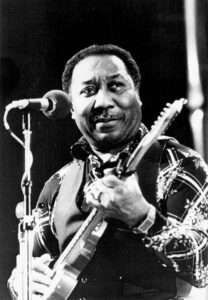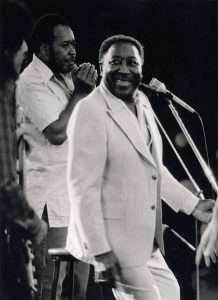
Muddy Waters, born McKinley Morganfield on April 4, 1913, in Rolling Fork, Mississippi, is often hailed as the father of modern Chicago blues. His journey from the cotton fields of the Mississippi Delta to the vibrant blues scene of Chicago laid the groundwork for the transformation of blues music and its profound influence on rock and roll.
Early Life and Delta Blues Roots
Muddy Waters grew up on Stovall Plantation near Clarksdale, Mississippi, where he first learned to play the harmonica and later the guitar. His early influences were blues legends like Son House and Robert Johnson, whose raw, emotional style would leave a lasting mark on his music. Waters honed his craft in the Delta, playing at local juke joints and house parties, where his deep voice and slide guitar skills began to attract attention.
In 1941, folklorist Alan Lomax recorded Waters for the Library of Congress, capturing the raw essence of his Delta blues sound. These recordings, later released commercially, helped launch Muddy Waters’ career and brought the Delta blues to a wider audience.
The Move to Chicago and the Birth of Chicago Blues
In 1943, Muddy Waters moved to Chicago, where he would revolutionize the blues genre. The urban environment of Chicago, with its electric guitars and amplified sound, was a stark contrast to the acoustic Delta blues. Waters embraced the change, adapting his style to fit the electric blues band format. His recordings for Chess Records in the late 1940s and early 1950s, including hits like “I Can’t Be Satisfied” and “Rollin’ Stone,” established him as a leading figure in the Chicago blues scene.

Muddy Waters’ band, featuring legendary musicians like Little Walter on harmonica and Jimmy Rogers on guitar, set the standard for electric blues bands. His powerful vocals, combined with the driving rhythm of his band, created a new, electrified version of the blues that would go on to influence countless musicians.
Muddy Waters’ Vocal Style, Songwriting, and Lyrics
Muddy Waters had a powerful and emotive vocal style, making him more than just a guitar hero. His voice is as recognizable in blues circles as Johnny Cash’s is in country music. On tracks like “Hoochie Coochie Man,” Muddy’s fairly deep, slightly gravelly voice conveyed the pain, joy, and experiences of African Americans with a raw authenticity. His vocal delivery and personality added an extra layer of emotion and realism to his performances, making them unforgettable.
As a songwriter, Waters often drew on his life experiences and the struggles of African Americans, embodying the concept of the “Southern Diaspora.” For example, the song “Mannish Boy” might seem like it’s just about boasting of manhood and sexual prowess. It was, however, a bold political statement. Waters once explained: “Growing up in the South, African-Americans [would] never be referred to as a man – but as ‘boy’. In this context, the song [is] an assertion of black manhood…” This layered meaning gave his music a powerful edge, resonating deeply with audiences.
Muddy’s lyrics frequently depicted the hardships of life, love, and societal issues. All of these contributed to the relatability and enduring appeal of his music. For instance, his song “Champagne & Reefer” was an early call for the legalization of marijuana, a controversial topic at the time. Other songs like “Rollin’ and Tumblin’” and “I Just Want to Make Love to You” showcased his ability to address universal themes with a unique blues twist.
Muddy Waters’ Influence
Muddy Waters was pivotal in transforming traditional Delta blues into a more electrified, urban sound. He played a significant role in popularizing the use of amplified instruments in blues. This would give birth to what is now known as Chicago blues. This innovation helped bridge the gap between rural, acoustic blues and urban, electrified blues. Waters collaborated with numerous musicians and played a crucial role in mentoring and nurturing talent within the blues community.
His influence extended beyond the blues genre. He impacted rock and roll artists such as The Rolling Stones, Eric Clapton, and Led Zeppelin, among many others. To illustrate Waters’ enormous influence, The Rolling Stones named themselves after his song “Rollin’ Stone,” as did *Rolling Stone* magazine. Bob Dylan referenced him with his classic song “Like a Rolling Stone.” Waters’ contributions to blues and popular music are immense, bringing the blues from the rural South to the urban North and forever altering the trajectory of the genre. His influence on subsequent generations of musicians is immeasurable, and his music remains an essential part of the blues (and rock) canon.
Muddy’s Legacy and Stray Observations
Muddy Waters continued to record and perform until his death on April 30, 1983. His legacy as a pioneering figure in blues and rock music is enshrined in the numerous awards and honors he received. This included six Grammy Awards and an induction into the Rock and Roll Hall of Fame. His influence is still felt today, as new generations of musicians continue to draw inspiration from his music.
In 1994, the U.S. Postal Service honored Muddy Waters with a 29-cent commemorative stamp. This would further cementing his place in American cultural history. One particularly relatable story from his early career comes from his first recording session with Alan Lomax in 1941. Lomax recorded Waters at his home in Mississippi. When Waters heard the playback of his own voice, he recalled:
“Man, you don’t know how I felt that Saturday afternoon when I heard that voice and it was my own voice. Later on, he sent me two copies of the pressing and a check for twenty bucks, and I carried that record up to the corner and put it on the jukebox. Just played it and played it and said, ‘I can do it, I can do it.’”
Muddy’s nickname came from his love of playing in muddy water as a child, given to him by his grandmother. This humble beginning belied the influence he would go on to have. Even Howlin’ Wolf, his label mate and competitive rival, couldn’t diminish the towering legacy that Muddy Waters would leave behind.
Conclusion
Muddy Waters had the ability to bridge the gap between the rural Delta blues and the urban Chicago sound. Combined with his powerful stage presence, innovative guitar work, and poignant songwriting, he cemented his place as a true icon of American music. His contributions to blues and rock music remain an enduring testament to his talent and vision.
